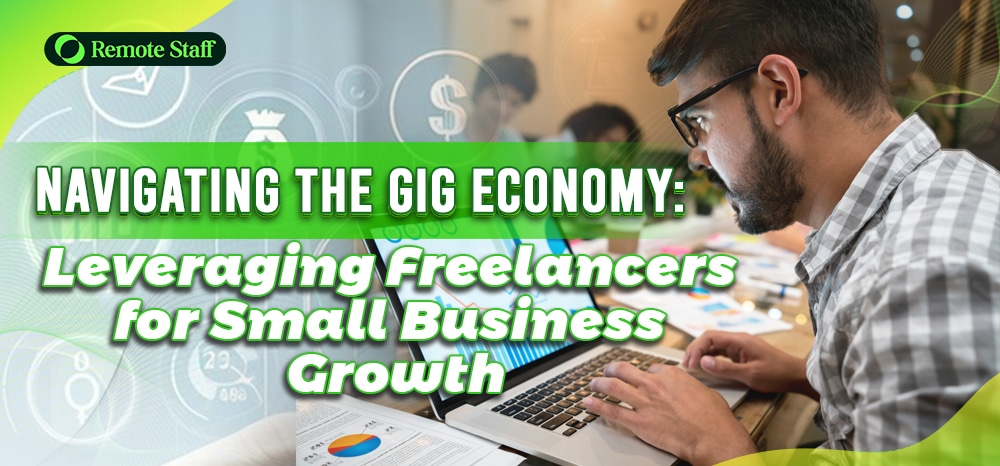Today’s rapidly evolving business landscape has witnessed the emergence of the gig economy. This transformative force redefined traditional employment models.
The gig economy is characterised by short-term, flexible jobs often facilitated through digital platforms. It allows professionals to engage in freelance or contract work over full-time positions.
Recent statistics reveal that freelancers now represent approximately 46.6% of the global workforce, with 1.57 billion people working independently out of 3.38 billion.
That said, the significant shift is driven by technological advancements and a growing preference for flexible work arrangements.
By embracing the gig economy, small business owners can leverage a diverse pool of independent contractors, digital nomads, and professionals seeking remote work opportunities.
This approach aligns with the evolving dynamics of contract-based employment and self-employment trends.
Keep reading to explore strategies for effectively integrating freelancers into your business model, the benefits, and the challenges of the gig economy.
Running a Small Business in the Gig Economy Age
The rise of the gig economy has reshaped how small businesses operate, providing on-demand workforce solutions that cater to modern business needs.
Unlike traditional employment models, contract-based employment allows business owners to hire independent contractors and remote professionals.
This shift towards skill-based hiring and workforce agility has given small businesses the ability to scale faster, optimise costs, and remain competitive in an evolving market.
However, the gig economy presents unique challenges that business owners must be aware of.
Challenges of Running a Small Business in Today’s Market
With evolving market trends, economic uncertainties, and shifting employment preferences, you must explore obstacles that can impact growth and sustainability:
- High Operating Costs: Traditional full-time employment models come with fixed payroll expenses, benefits, and overhead costs that can strain small business budgets.
- Talent Acquisition Difficulties: Finding specialised skills through conventional hiring methods can be time-consuming and costly.
- Market Uncertainty: Economic shifts, industry disruptions, and unexpected global events make long-term financial commitments risky.
- Scaling Limitations: Expanding operations requires additional resources, which can be challenging for small businesses with limited budgets.
- Administrative Burdens: Payroll management, compliance regulations, and legal responsibilities add complexity to business operations.
Why More Business Owners Are Hiring Freelancers

To stay competitive, more business owners are turning to freelancers and independent contractors because of:
- Cost-Effective Workforce Solutions: You can hire freelancers or remote Filipino workers on a task-based or short-term contract basis, reducing long-term financial commitments.
- Access to Niche Talent: Skill-based hiring allows small businesses to find highly qualified specialists without the need for full-time employment.
- Flexible Hiring Models: On-demand workforce options enable companies to scale up or down based on project needs.
- Global Workforce Availability: Hiring independent contractors and Filipino freelancers guarantees 24/7 productivity by leveraging different time zones.
- Reduced Onboarding and Training Costs: Freelancers come pre-skilled and require minimal training, allowing businesses to save time and resources.
How the Gig Economy Empowers Business Owners
The gig economy offers small businesses the following advantages:
- Workforce Agility: Hiring remote professionals gives businesses the ability to adapt quickly to changing demands.
- Increased Productivity: Digital platforms make contract-based employment more efficient, allowing projects to be completed faster with fewer resources.
- Scalable Business Growth: Small businesses can expand their operations without the constraints of traditional hiring.
- Hybrid Work Models: A mix of full-time employees and freelancers provides the best of both worlds—stable operations with flexible workforce support.
- Access to Digital Tools and Expertise: Many Filipino VA services and Philippines-based virtual help professionals specialise in digital marketing, admin support, IT, and customer service, making it easier for businesses to thrive.
Benefits of Hiring Freelancers for Small Businesses
Hiring freelancers provides cost-effective, flexible, and highly skilled workforce solutions that drive business success.
Whether it’s short-term contracts or ongoing remote opportunities, freelancers allow small businesses to operate more efficiently without the constraints of full-time employment.
Cost Efficiency Without Sacrificing Quality
Freelancers offer high-quality services at competitive rates, making it easier for small businesses to optimise budgets while accessing specialised expertise.
This is particularly beneficial when hiring Filipino freelancers as they provide top-tier services at cost-effective rates.
Flexibility & Scalability
Unlike traditional employees, gig workers can be hired on-demand, allowing businesses to scale up or down as needed.
This workforce agility makes sure that companies only pay for work when it’s required, avoiding unnecessary expenses.
Access to Global Talent & Round-the-Clock Productivity
Hiring freelancers allows businesses to tap into a global talent pool and work with digital nomads and Filipino workers in different time zones.
This means projects can be completed 24/7, improving turnaround times and efficiency.
Faster Execution & Project Turnaround
Freelancers are task-focused and deadline-driven, so you can expect quicker project completion without compromising quality.
Many Filipino VA services and contract-based professionals specialise in fast and high-quality work, making them valuable assets for small businesses looking to grow.
How to Find & Manage Freelancers Effectively
As the gig economy grows, small businesses must develop effective strategies for hiring and managing freelancers to maximise productivity.
Remember that finding the right team member requires careful selection, setting clear expectations, and effective communication.
By leveraging on-demand workforce models, businesses can maintain workforce agility while accessing top talent from around the world.
Where to Hire Freelancers for Different Business Needs
One of the best ways to access remote work opportunities is by partnering with specialised outsourcing platforms that connect businesses with highly skilled professionals.
While many entrepreneurs turn to marketplaces like Upwork, a more strategic approach is to work with established providers such as:
- Remote Staff: Specialises in Filipino VA services, remote Filipino workers, and Philippines-based virtual help, offering screened, pre-qualified professionals for various industries.
- Fiverr: Great for one-off projects and task-based work, but may require additional vetting and management.
- OnlineJobs.ph: A direct job board for hiring Filipino freelancers, though it requires businesses to manage hiring and contracts independently.
For small businesses seeking long-term freelancers, Remote Staff provides workforce solutions that go beyond traditional hiring platforms by handling payroll, compliance, and performance monitoring.
Evaluating Candidates: What Business Owners Should Look For
You need to hire professionals who would definitely help your business grow, and here are the things you should look for:
- Relevant Work Experience. Check previous projects, industry expertise, and client reviews.
- Skill-Based Hiring. Match freelancers’ skills to business needs, whether it’s digital marketing, admin support, IT, or creative work.
- Communication Skills. Look for clear and professional communication, especially in remote settings.
- Work Ethic & Reliability. Evaluate timeliness, responsiveness, and professionalism through trial tasks or test projects.
- Adaptability & Workforce Agility. Make sure freelancers can adjust to business demands and deadlines.
Setting Clear Expectations & Contracts
To build a successful working relationship with freelancers, you have to establish clear guidelines from the very beginning.

Defining project scope, payment terms, and communication protocols helps prevent misunderstandings and keeps work aligned with the business goals.
Best Tools for Collaboration & Productivity
If you want to successfully manage your freelance team, you can utilise the following tools:
- Asana/Trello. For task-based and project management tracking.
- Slack/Microsoft Teams. For real-time messaging and communication.
- Zoom/Google Meet. For video conferencing and team check-ins.
- Time Doctor/Hubstaff. For time tracking and remote productivity monitoring.
- Google Drive/Dropbox. For file sharing and collaborative work.
Common Challenges & Solutions in Working with Freelancers
While hiring freelancers offers cost-effective and flexible workforce solutions, businesses often face certain challenges:
Communication & Work Alignment Issues
Miscommunication can lead to missed deadlines, errors, or project delays.
Setting up clear communication protocols, using real-time messaging tools, and holding regular check-ins help keep freelancers aligned with business objectives.
Managing Time Zone Differences & Remote Work Schedules
Working with freelancers such as remote Filipino workers means possible time zone challenges.
Establishing flexible working hours, using time management tools, and aligning on overlapping availability help maintain workflow consistency.
Quality Assurance & Performance Monitoring
There are so many talented freelancers out there, but it’s best to go for the ones that provide quality work, which is best measured through:
- Sample Work Provided Before Hiring. Helps verify skills and work quality before committing to a long-term contract.
- Key Performance Indicators (KPIs). Track task completion rates, response times, and output quality.
- Performance Reviews. Regular feedback helps freelancers improve and adapt to business needs.
- Time-Tracking Tools. Measures accountability while maintaining fair work expectations.
It is best to implement proactive management strategies that can help you optimise freelance collaboration and overcome these obstacles.
Effectively managing freelancers can help increase work efficiency and reduce costs, making the gig economy a valuable asset for long-term growth.
Future Trends: The Evolving Role of Freelancers in Small Business Success
Technological advancements, particularly in AI and automation, are reshaping freelance work dynamics.
Understanding these trends is essential for businesses aiming to thrive in this evolving landscape.
How Freelancers Are Becoming a Core Part of Business Strategies
Integrating freelancers into your core business operations helps you leverage the on-demand workforce for specialised tasks and projects.
This approach enhances workforce agility, allowing businesses to adapt swiftly to market changes without the long-term commitments of traditional employment.
By embracing hybrid work models, companies can efficiently scale resources up or down, optimising productivity and cost effectiveness.
The Impact of AI & Automation on Freelance Work
As AI and automation continue to evolve, they’re transforming how freelancers operate:
- Task Automation. Routine tasks are increasingly handled by AI, enabling freelancers to focus on complex and creative projects.
- New Opportunities. AI advancements create demand for freelancers skilled in AI integration, data analysis, and machine learning.
- Collaboration Tools. AI-powered platforms enhance collaboration between freelancers and businesses, improving efficiency.
- Ethical Considerations. Business owners must reinforce strong ethical AI use to avoid violations like plagiarism.
Adapt to these advancements to stay competitive while being safe from potential risks.
The Future of Remote Work & Small Business Hiring
The trajectory of remote work suggests a sustained shift towards flexible work arrangements.
Small businesses are expected to continue leveraging remote work opportunities, accessing a global talent pool that includes digital nomads and independent contractors.
This shift promotes skill-based hiring and the utilisation of task-based contracts, aligning with the evolving preferences of the modern workforce.
As technology advances, businesses that adapt to these trends are likely to experience enhanced innovation and competitiveness.
FAQ Section
Here are answers to some of the most common questions business owners have when integrating remote work opportunities into their operations.
What Are the Best Ways to Ensure Freelancer Reliability?
Hiring from reputable platforms like Remote Staff, conducting skill-based hiring assessments, and setting clear expectations from the start are key.
Reviewing past work, client testimonials, and performance ratings also helps in selecting dependable freelancers.
Establishing a structured communication plan, defined milestones, and performance tracking tools further enhances freelancer accountability.
How Much Does It Cost to Hire a Freelancer?
Freelancer rates vary based on expertise, industry, and geographic location. Hiring Filipino freelancers is often a cost-effective option.
These professionals’ rates are generally lower than their Western counterparts without compromising the quality of their output.
A Filipino virtual assistant can charge an hourly rate, while others work on task-based or project-based pricing, allowing businesses to maintain budget flexibility.
What Tasks Can a Freelancer Handle for a Small Business?
Freelancers can manage various business functions, including digital marketing, customer support, bookkeeping, content creation, web development, graphic design, and administrative support.
Many Filipino VA services and Philippines-based virtual help professionals specialise in handling repetitive or time-consuming tasks, so business owners can focus on growing their business.
Final Thoughts
The gig economy is a game-changer for small businesses looking to scale efficiently.
By leveraging freelancers, you can access a highly skilled, flexible workforce that delivers results.
 To stay competitive, you must embrace workforce agility, adopt hybrid work models, and optimise hiring strategies for maximum growth.
To stay competitive, you must embrace workforce agility, adopt hybrid work models, and optimise hiring strategies for maximum growth.
The future of work is evolving—will your business evolve with it?
- Want FREE AI Prompts for Different Areas of Your Business? Check out these 100 AI prompts.
- Curious About How to SAVE and Maximize on Taxes? Learn more here.
- If you’re ready to experience the full advantages of working with a top global team, check out our 1,000 fully vetted and highly talented staff here.
Darren Aragon is a multifaceted writer with a background in Information Technology, beginning his career in research at Pen Qatar and transitioning through customer service to a significant role at Absolute Service, Inc. His journey into freelance writing in 2021 has seen him excel across various niches, showcasing his adaptability and deep understanding of audience engagement.




















